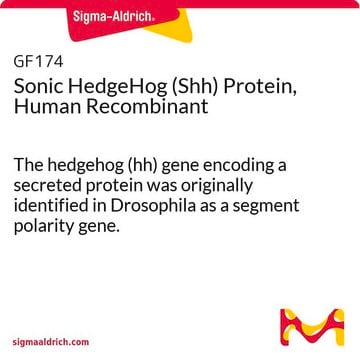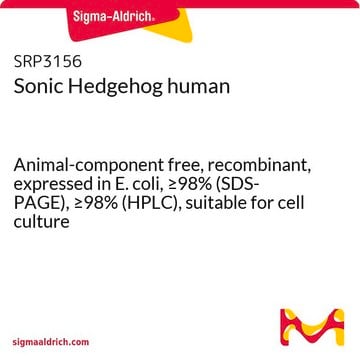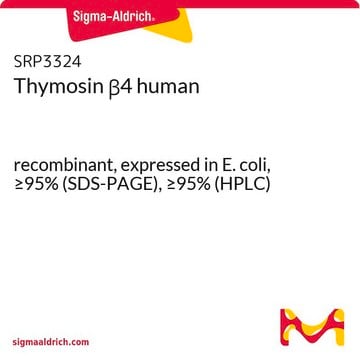S0191
Sonic Hedgehog Peptide from mouse
≥97% (SDS-PAGE), recombinant, expressed in E. coli, Fused to a histidine tag at the C-terminus, lyophilized powder
Sinónimos:
Shh
About This Item
Productos recomendados
biological source
mouse
Quality Level
recombinant
expressed in E. coli
assay
≥97% (SDS-PAGE)
form
lyophilized powder
potency
0.4-3.0 μg/mL ED50
mol wt
predicted mol wt 20 kDa
packaging
pkg of 25 μg
storage condition
avoid repeated freeze/thaw cycles
impurities
<1 EU/μg
UniProt accession no.
storage temp.
−20°C
Gene Information
mouse ... Shh(20423)
General description
Application
Biochem/physiol Actions
Other Notes
Physical form
Storage Class
11 - Combustible Solids
wgk_germany
WGK 2
flash_point_f
Not applicable
flash_point_c
Not applicable
Certificados de análisis (COA)
Busque Certificados de análisis (COA) introduciendo el número de lote del producto. Los números de lote se encuentran en la etiqueta del producto después de las palabras «Lot» o «Batch»
¿Ya tiene este producto?
Encuentre la documentación para los productos que ha comprado recientemente en la Biblioteca de documentos.
Artículos
Cancer stem cell media, spheroid plates and cancer stem cell markers to culture and characterize CSC populations.
Cancer stem cell media, spheroid plates and cancer stem cell markers to culture and characterize CSC populations.
Cancer stem cell media, spheroid plates and cancer stem cell markers to culture and characterize CSC populations.
Cancer stem cell media, spheroid plates and cancer stem cell markers to culture and characterize CSC populations.
Nuestro equipo de científicos tiene experiencia en todas las áreas de investigación: Ciencias de la vida, Ciencia de los materiales, Síntesis química, Cromatografía, Analítica y muchas otras.
Póngase en contacto con el Servicio técnico








